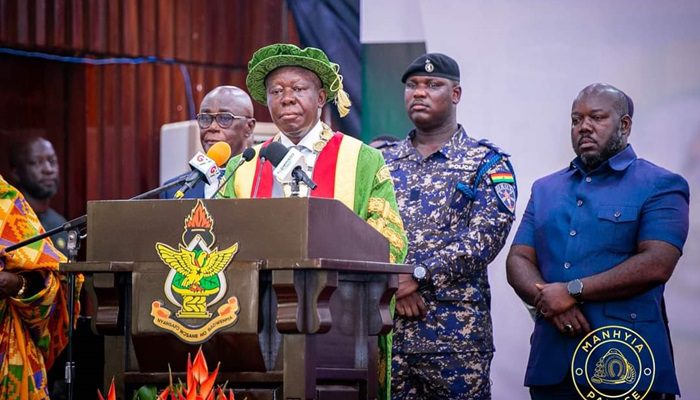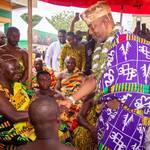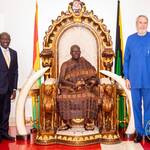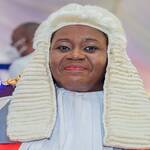The Asantehene, Otumfuo Osei Tutu II, has raised serious concerns over the ongoing political deadlock in Ghana’s Parliament, warning that it poses “a looming danger” to the nation’s peace, stability, and democratic integrity.
In a candid statement, he emphasized the urgent need for resolution to avoid potentially catastrophic consequences.
Speaking at the final session of the 58th congregation of the Kwame Nkrumah University of Science and Technology (KNUST) in Kumasi, the Asante King lamented the deepening political divisions in Ghana and across the ECOWAS sub-region.
He highlighted the increasing conflicts across Africa, noting that political disagreements have historically fueled instability, and now, Ghana’s democratic reputation is at risk.
A nation at a crossroads
“The consequences of it can be incalculable,” Otumfuo Osei Tutu II warned, addressing the impasse in Parliament that has become a source of national concern.
He pointed to the refusal of political leaders to let go of past grievances, which has exacerbated tensions and hindered cooperation among the state institutions meant to ensure peace and order.
According to the Asantehene, these developments threaten the nation’s pride as a fountain of democracy.
He further noted that political divisions within Ghana are eroding the very foundation of state institutions, which should be the guarantors of peace, stability, and the rule of law.
These tensions, he said, must not be allowed to continue unchecked.
The danger of ignoring history’s lessons
The Asantehene cautioned political leaders that they were in danger of repeating the mistakes of the past, ignoring the lessons of history, and failing to recognize the consequences of miscalculations in the political environment.
He stressed that no system of governance can endure without a process for reconciliation and resolving differences, which he described as not only a constitutional necessity but also a core principle of African traditional governance.
“No system of governance can be sustained without the process by which differences are reconciled and litigations brought to an end. It is not just a necessary requirement of our constitutional democracy; it is one of the strengths of African traditional governance,” Otumfuo Osei Tutu II stated.
He went on to say that parliamentarians, when elected, should be capable of engaging in rigorous debates while also finding common ground and reconciling conflicting opinions.
This ability to resolve differences and work together is crucial, especially at a time when Ghana’s democracy is still in its formative stages and cannot afford prolonged political instability.
The economic crisis and global turmoil
The Asantehene also turned his attention to the economic challenges facing Ghana, particularly in the aftermath of the COVID-19 pandemic.
He acknowledged that the country’s economy is in a fragile state and emphasized that whoever wins the upcoming elections will face a daunting task of rebuilding and rejuvenating the economy.
“The economy is not in the best shape after the COVID-19 crisis. Whoever wins this election is going to have a battle on his hands to rejuvenate the economy,” he remarked.
Adding to the urgency, Otumfuo noted the global turmoil, pointing out that even the world’s most powerful nations are currently preoccupied with their own priorities, leaving little room for attention to the concerns of smaller nations like Ghana.
He warned that Ghanaians cannot afford the luxury of prolonged and fruitless political disputes, especially as the country faces significant economic challenges and global uncertainties.
A call for unity and bipartisanship
In his address, the Asantehene emphasized the need for bi-partisan cooperation in Ghana’s political landscape.
He urged that both political parties must recognize that the success of the nation cannot be achieved by one party alone.
“No party can administer the affairs of the nation without the cooperation of the other party,” he stressed.
Otumfuo Osei Tutu II called for political leaders to put aside their differences and work together for the greater good of the country.
He pointed out that successful governance in Ghana, or any country for that matter, requires collaboration across party lines to address the challenges that the nation faces.
This is particularly true as Ghana prepares for what is likely to be a highly contentious election year.
A nation at risk of shattered dreams
The Asantehene concluded with a stark warning: if political leaders do not act swiftly to resolve the current impasse and work together to heal the rifts, the country faces the very real risk of a “revolution of shattered dreams.”
He stressed that every individual involved in the electoral process must be aware of the stakes and understand the gravity of the situation.
“We must be clear in our minds that we cannot afford the luxury of any prolonged fruitless litigations in the years ahead,” he advised, urging voters to recognize the importance of electing leaders who will hit the ground running and unite the country in the face of its challenges.
The Asantehene’s comments come at a crucial time for Ghana, as the nation stands at a crossroads in its democratic journey.
With political tensions high and the country grappling with economic instability, his call for unity and reconciliation could not be more urgent.
In his view, the path forward lies in resolving differences, forging cooperation, and rebuilding the nation’s economic and political foundations.
- Military service commanders sworn into Armed Forces Council - 25 April 2025
- Finance Minister unveils plan to tackle 2024 payables - 25 April 2025
- 2 potential flagbearers donate GH¢3m and GH¢1m to NPP - 25 April 2025




